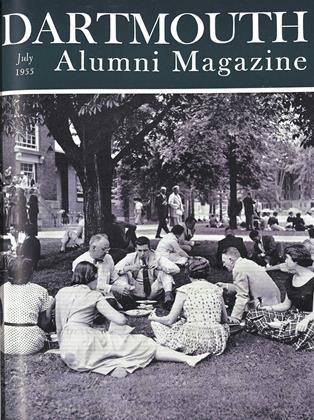By Maurice Mandelbaum '29.Glencoe, Illinois: The Free Press, 1955.338 pp. $5.00.
I have often suspected that many writers on the moral life seek to raise their works to heights of importance by contriving to give the impression that, if the world does not heed their advice, civilization will utterly collapse. It is refreshing to find an author who not only admits but rejoices that the quality of man's moral consciousness does not depend upon the advance of philosophic ethics, (p. 42) Professor Mandelbaum, who currently chairs the Department of Philosophy at Dartmouth, has written on the moral life with fine sensitivity and with penetrating human wisdom. Though he declines, as I have suggested, the role of the savior of man's moral nature, he has written a serious and scholarly work which will contribute to the constantly recurring task of seeking to understand our moral life.
Whatever theory one might espouse concerning the ultimate foundations of morality, he may learn much from this volume. One reason for this is that, as the word "phenomenology" in the title suggests, the author remains at all times in close contact with ordinary moral experience. His method is to begin with "a direct examination of the data of men's moral consciousness," in contrast to an approach which seeks to solve the problems of ethics on the basis of hypotheses drawn from other fields, (pp. 30-31) On the one hand, Professor Mandelbaum is able to do justice to the immense variety of moral situations and judgments. On the other hand, he is able to relate them as members of one genus by means of his well-defended and documented argument that all moral judgments, of whatever kind, "are grounded in our apprehension of relations of fittingness or unfittingness between the responses of a human being and the demands which inhere in the situation by which he is faced." (p. 181)
Perhaps the most widespread appeal of the book will consist in its fresh approach to the thorny issue of ethical norms. Is there a norm tor conduct which is universal? The author suggests that absolutism has had its appeal in the unquestionable fact that, when we make a moral judgment, we do believe that we are responding to an objective demand which is independent of our personal desires. On the other hand, relativism appears to be strengthened by the persistence of what appear to be genuine moral disagreements in spite of all attempts to win agreement. The author's position differs from both traditional absolutism and traditional relativism. While he denies that any universal contentual norm for human conduct can be established, he makes a strong case for the view that there are universal canons by which the validity of moral judgments may be estimated. (Ch. 6)
 View Full Issue
View Full Issue
More From This Issue
-
 Feature
FeatureADMINISTRATIVE CHANGES
July 1955 -
 Feature
FeatureAlumni Fund Tops $760,000
July 1955 -
 Feature
FeaturePresident Eisenhower Visits the Grant
July 1955 -
 Class Notes
Class Notes1930's History-Making 25th
July 1955 By RICHARD W. BOWLEN '30 -
 Article
ArticleThe 1955 Commencement
July 1955 By FRANK PEMBERTON -
 Class Notes
Class Notes1934's Happy 21 st
July 1955 By HENRY WERNER '34
FRED BERTHOLD JR. '45
-
 Books
BooksCATHOLICISM AND AMERICAN FREEDOM
June 1952 By FRED BERTHOLD JR. '45 -
 Books
BooksTHE LAST ADAM.
MAY 1967 By FRED BERTHOLD JR. '45 -
 Books
BooksCHRISTIAN FAITH IN BLACK AND WHITE: A PRIMER IN THEOLOGY FROM THE BLACK PERSPECTIVE.
May 1974 By FRED BERTHOLD JR. '45 -
 Article
ArticleEndowed Professorships
FEBRUARY 1973 By FRED BERTHOLD JR. '45, R.B.G.
Books
-
 Books
BooksFACULTY PUBLICATIONS
November, 1922 -
 Books
BooksConnely '11 at New Post
JUNE 1930 -
 Books
BooksEFFECTIVE USE OF BUSINESS CONSULTANTS.
JANUARY 1964 By ALVAR O. ELBING JR. -
 Books
BooksGENERAL COLLEGE CHEMISTRY.
November 1954 By ELDEN B. HARTSHORN '12 -
 Books
BooksA NAVAL LOG,
October 1945 By Homer Howard, Lieut. Comdr., USNR. -
 Books
BooksTHE IGNORANCE OF CERTAINTY.
MARCH 1971 By JOHN HURD '21

